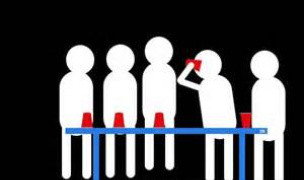 10 Terms
10 TermsHome > Terms > English (EN) > consumerism
consumerism
While all societies consume, mass consumption has taken on intense and multiple meanings within American society since the nineteenth century when advances in mass production and a continental market demanded a new mass consumer. This new person was fostered by newspaper advertising and department stores that channeled new affluence. Later, radio, film, television and the Internet have all created commercial media in which sales, sponsorship, product placement and information become intertwined. Consumption, despite repeated anticonsumerist movements, is also deeply linked to identity and status—class is read as consumption rather than production.
Contemporary consumption is framed by its economic history of the Great Depression in the 1930s followed by postwar affluence. A Depression “mentality” and the experience of limited rationing in the Second World War directly influenced parents of baby boomers, as well as new generations themselves. Yet for many products were our most important progress as new automobiles, appliances and materials created suburbs and recreated urban lifestyles. The postwar period, in particular, identified children and teenagers as consumers, shaping the intensive niche marketing that in later decades has driven fashion, media, music and other products. The Reagan era became a second spring for consumerism, from the borrowed designer dresses of the First Lady to the yuppies of Wall Street. Expanding credit cards (and debts) replaced savings as baby boomers and their offspring came into employment maturity at a time of apparently constant growth.
The postwar boom did not eliminate divisions in consumption even as it enshrined ideals of the marketplace. Among the struggles of the civilrights movement were African American demands for equal consumption—access to previously segregated department stores or public accommodations. Women, as consumers for the home, dependent on a husband’s salary also learned to establish economic independence through consumption and credit histories. The poor were doubly exploited—unable to buy as readily yet forced to consume cheaper or second-hand goods, or through plans like rental purchase or other financing agreements that doubled prices for inferior products.
One might not buy a new automobile every year, for example, but one is forced either to find something to deal with increasingly diffuse metropolitan life, or become more marginal to an automotive culture.
Intellectual movements have spoken against this intensive consumption in various ways: the beatniks of the 1950s and hippies of the 1960s both represent anti-materialist movements—although their stress on handicrafts or imported goods betrays an alternative consumption as well. Religious groups have promoted spirituality rather than materialism, yet wealthy churches and consumer-based religions, exchanging miracles for donations, underscore a synthesis of God and mammon long criticized in American life. Environmentalists have also pointed out that another result of runaway consumerism is runaway waste, evident in overflowing landfills and polluted ecosystems nationwide, even while “green” products also sell. Political and economic analysts also warn of the dangers of dependent consumerism—whether in the oil crisis of the 1970s or the continuous trade imbalances of the 1990s. Yet, at the same time, American consumption is seen as a vital component of world economic revitalization, where a sneaker plant in Indonesia represents both exploitation and opportunity Indeed, after the 1990’s extended growth and spending, consumerism is deeply ingrained in American society as an emblem of success, a source of individual satisfaction and a motor for American global power. At the same time, consumption is a discourse of division in a polarized society—where children may kill for expensive sneakers, while schools promote uniforms to “restrain” competition in the classroom.
Indeed, extensions of consumerism into areas of public good challenge American dreams of equality and democracy Should one have the right to buy media domination or political influence? Is the Internet a new agora or a new mall? Are education, healthcare and housing public rights or phenomena of the marketplace? Is freedom to consume, in fact, the pervasive yet hushed underpinning of the American dream, as well as the engine of American nightmares at home and abroad?
- Part of Speech: noun
- Synonym(s):
- Blossary:
- Industry/Domain: Culture
- Category: American culture
- Company: Routledge
- Product:
- Acronym-Abbreviation:
Other Languages:
Member comments
Terms in the News
Billy Morgan
Sports; Snowboarding
The British snowboarder Billy Morgan has landed the sport’s first ever 1800 quadruple cork. The rider, who represented Great Britain in the 2014 Winter Olympics in Sochi, was in Livigno, Italy, when he achieved the man-oeuvre. It involves flipping four times, while body also spins with five complete rotations on a sideways or downward-facing axis. The trick ...
Marzieh Afkham
Broadcasting & receiving; News
Marzieh Afkham, who is the country’s first foreign ministry spokeswoman, will head a mission in east Asia, the state news agency reported. It is not clear to which country she will be posted as her appointment has yet to be announced officially. Afkham will only be the second female ambassador Iran has had. Under the last shah’s rule, Mehrangiz Dolatshahi, a ...
Weekly Packet
Language; Online services; Slang; Internet
Weekly Packet or "Paquete Semanal" as it is known in Cuba is a term used by Cubans to describe the information that is gathered from the internet outside of Cuba and saved onto hard drives to be transported into Cuba itself. Weekly Packets are then sold to Cuban's without internet access, allowing them to obtain information just days - and sometimes hours - after it ...
Asian Infrastructure Investment Bank (AIIB)
Banking; Investment banking
The Asian Infrastructure Investment Bank (AIIB) is an international financial institution established to address the need in Asia for infrastructure development. According to the Asian Development Bank, Asia needs $800 billion each year for roads, ports, power plants or other infrastructure projects before 2020. Originally proposed by China in 2013, a signing ...
Spartan
Online services; Internet
Spartan is the codename given to the new Microsoft Windows 10 browser that will replace Microsoft Windows Internet Explorer. The new browser will be built from the ground up and disregard any code from the IE platform. It has a new rendering engine that is built to be compatible with how the web is written today. The name Spartan is named after the ...
Featured Terms
bodhisattwa
Members of the early schools and Therevada generally understand this as the historical Buddha Shakyamuni in his previous lives. For members of the ...
Contributor
Featured blossaries
stanley soerianto
0
Terms
107
Blossaries
6
Followers
Top 10 Most Venomous Snakes
 10 Terms
10 Terms
Browers Terms By Category
- Osteopathy(423)
- Acupuncture(18)
- Alternative psychotherapy(17)
- Ayurveda(9)
- Homeopathy(7)
- Naturopathy(3)
Alternative therapy(489) Terms
- General boating(783)
- Sailboat(137)
- Yacht(26)
Boat(946) Terms
- Cultural anthropology(1621)
- Physical anthropology(599)
- Mythology(231)
- Applied anthropology(11)
- Archaeology(6)
- Ethnology(2)
Anthropology(2472) Terms
- Medicine(68317)
- Cancer treatment(5553)
- Diseases(4078)
- Genetic disorders(1982)
- Managed care(1521)
- Optometry(1202)
Health care(89875) Terms
- General architecture(562)
- Bridges(147)
- Castles(114)
- Landscape design(94)
- Architecture contemporaine(73)
- Skyscrapers(32)




